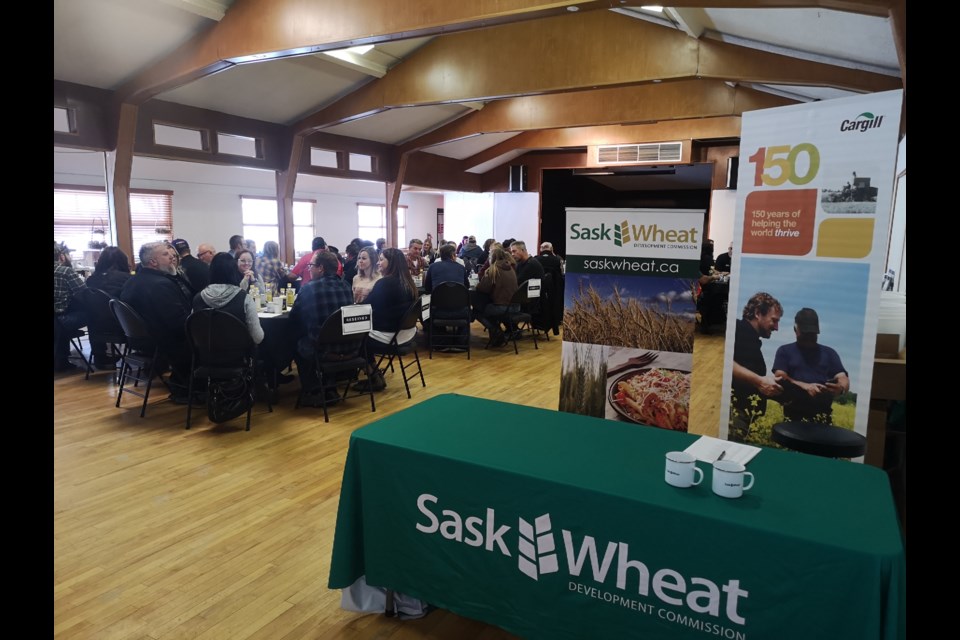The latest ‘Coffee Shop Talks’ event hosted by Sask. Wheat took place Nov. 1 at the Sportsman’s Centre in Moose Jaw, allowing local agriculture producers the chance to speak directly with industry experts, voice their concerns, and receive immediate feedback.
The event proved to be popular with around 80 people in attendance, and Moose Jaw witnessed the largest iteration of the workshop so far.
“We’re excited that we had a good turnout,” said Montana Getty, communication and events coordinator with the Sask. Wheat Development Commission (Sask. Wheat). “We’re only hoping they get bigger from here on out.”
The recent event trialled a new format in response to feedback from two earlier talks in March 2023. At these earlier events, the talk was set up in a classroom style and saw a panel of five or six people provide information at the front of the room. After around 45 minutes, the format changed to one-on-one conversations.
Getty said the latest event sought to make the format a lot less formal.
“You get to sit down and it’s almost like having coffee with your friends and talking about the issues that you have on your own farm, but you get to talk about those issues with the experts who can actually help you with them and have a coffee and relax,” she said.
The new format included two industry experts seated at each table, and farmers moved from table to table after a 10-minute talk. Each expert introduced themselves and spoke about their field, and a later open-floor discussion let farmers talk directly to the most relevant specialists.
Feedback from the event has been generally positive.
“It’s always good, and you get to meet a lot of people in the industry and hear what they have to say,” explained agriculture producer Nathan Bean.
“Every area (in Saskatchewan) is different,” he added. “The good thing is that you get to talk to some of the producers who are in your area.”
Among the industry experts at the event were Dr. Kelly Turkington, research scientist and plant pathologist with AAFC (Agriculture and Agri-Food Canada) Lacombe and Chris Holzapfel, research manager with IHARF (Indian Head Agricultural Research Foundation).
Another expert, Dr. Tyler Wist, is a field crop entomologist with AAFC Saskatoon.
“This is our opportunity as researchers to get in the room, drink coffee, and hang out with farmers to (spread)… knowledge. It’s cool if I write papers, but farmers are probably not going to read those… (so) here I am telling them about the end-results of our research,” Dr. Wist said.
Dr. Wist covered several topics and grasshoppers were among the leading pests brought up at the discussion. “It’s been a really strong grasshopper year…,” he said, noting that 2023 has been a bad year for numbers of the small plant-eating insect.
One of Dr. Wist’s projects includes an idea to help control the wheat midge pests that are prevalent throughout Saskatchewan. This has resulted in an initiative called ‘Midge-Busters,’ and he devised a system of pheromone-laden traps that attract and remove male members of the species.
More information about Dr. Wist and his work can be found on X (formerly Twitter) at #Midge Busters.
Mr. Moats owns a farm east of Regina and was one of the guests at the talk.
“You know, to be totally honest I wasn’t expecting the informal format of the event. I thought I was going to be listening to panelists trying to present on the stage,” Moats confessed.
“I’m actually really glad that I came. This different format allows for a lot more individual interaction with the experts that they brought here, and I really enjoyed myself,” he added.
Moats said the information provided at the event was far easier to access and make sense of in terms of context than self-directed research has been. “Could I find (the answer)? Sure. Is it transmitted effectively if I found it myself? Probably not as much.”
Moats brought up a point expressed by other guests – the talk provided an excellent opportunity to form new connections within the industry.
“I think that this type of event helps build connections in the agriculture community, which is something that I think we have less of than ever (before). I’m really glad I came. I met some people, and it was good,” he said. “Everybody at my table knows each other now, and everybody knows the names of the experts they visited with. That kind of connection isn’t always easy to build, and I think we have it now.”
Sask. Wheat is always looking to improve the talks through feedback.
To enter the door prize giveaway, the ballot serves as both an entry and a feedback form. “We have air pods, golf balls, hats, and all kinds of things for the giveaway. We really encourage people to fill out those feedback forms so we can make these events a lot better for them,” Getty said.
The event has already seen an additional hour added, and one common suggestion is to add more time for each of the smaller timed discussions.
Due to the popularity of the event, Getty said it’s likely going to be a permanent occurrence. “We definitely hope to keep it going, and we have three more events in the new year as well,” she confirmed.
“We really appreciate the invitation, and having Cargill and Sask. Wheat getting everyone together, and getting like-minded groups together, so we can make a better province (that works) for producers,” Bean concluded.
For more information, visit SaskWheat.ca/coffee-shop-talks.
In response to some providers blocking access to Canadian news on their platforms, our website, MooseJawToday.com will continue to be your source for hyper-local Moose Jaw news. Bookmark MooseJawToday.com and sign up for our free online newsletter to read the latest local developments.


.png;w=120;h=80;mode=crop)

